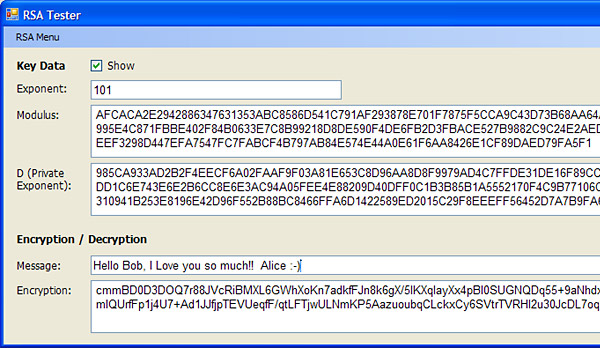Python Rsa Key Generation Example
Jun 19, 2019 RSA Encrypt / Decrypt - Examples. Now let's demonstrate how the RSA algorithms works by a simple example in Python.The below code will generate random RSA key-pair, will encrypt a short message and will decrypt it back to its original form, using the RSA-OAEP padding scheme. First, install the pycryptodome package, which is a powerful Python library of low. Aug 19, 2018 Python PyCrypto: Generate RSA Keys Example.py def generateRSA (bits = 2048): ' Generate an RSA keypair with an exponent of 65537 in PEM format: param: bits The key length in bits: Return private key and public key ' from Crypto. PublicKey import RSA: newkey = RSA. Generate (bits, e = 65537).
| # Inspired from http://coding4streetcred.com/blog/post/Asymmetric-Encryption-Revisited-(in-PyCrypto) |
| # PyCrypto docs available at https://www.dlitz.net/software/pycrypto/api/2.6/ |
| fromCryptoimportRandom |
| fromCrypto.PublicKeyimportRSA |
| importbase64 |
| defgenerate_keys(): |
| # RSA modulus length must be a multiple of 256 and >= 1024 |
| modulus_length=256*4# use larger value in production |
| privatekey=RSA.generate(modulus_length, Random.new().read) |
| publickey=privatekey.publickey() |
| returnprivatekey, publickey |
| defencrypt_message(a_message , publickey): |
| encrypted_msg=publickey.encrypt(a_message, 32)[0] |
| encoded_encrypted_msg=base64.b64encode(encrypted_msg) # base64 encoded strings are database friendly |
| returnencoded_encrypted_msg |
| defdecrypt_message(encoded_encrypted_msg, privatekey): |
| decoded_encrypted_msg=base64.b64decode(encoded_encrypted_msg) |
| decoded_decrypted_msg=privatekey.decrypt(decoded_encrypted_msg) |
| returndecoded_decrypted_msg |
| ########## BEGIN ########## |
| a_message='The quick brown fox jumped over the lazy dog' |
| privatekey , publickey=generate_keys() |
| encrypted_msg=encrypt_message(a_message , publickey) |
| decrypted_msg=decrypt_message(encrypted_msg, privatekey) |
| print'%s - (%d)'% (privatekey.exportKey() , len(privatekey.exportKey())) |
| print'%s - (%d)'% (publickey.exportKey() , len(publickey.exportKey())) |
| print' Original content: %s - (%d)'% (a_message, len(a_message)) |
| print'Encrypted message: %s - (%d)'% (encrypted_msg, len(encrypted_msg)) |
| print'Decrypted message: %s - (%d)'% (decrypted_msg, len(decrypted_msg)) |
commented Aug 11, 2018
I ran this code but got an error. It is python 3.7 running the latest PyCryptodome File 'C:(the file location and name but i'm not going to list it).py', line 29 |
commented Aug 15, 2018
@maxharrison These print statements indicate it was written for python 2. It could be easily fixable by making use of the print function instead of the print statement., however, no guarantees. |
commented Aug 31, 2018

I am trying to learn this stuff. When I run this, I get the following error. |
commented Sep 18, 2018 • edited
edited
Hi @anoopsaxena76, Just change the encryption line as this: I just did it myself, it works like a charm |
commented Aug 28, 2019
Python Rsa Generate Key Pair
Hey, I'm trying to run this code on Python 3.7 too. What did you change apart from that print statement to adapt the code to Pycrytodome?
Please help! |

commented Sep 13, 2019
Hi @GavinAren, I hope you've already solved your issue but if not: |
commented Oct 2, 2019
Python Rsa Key Generator
PyCrypto is written and tested using Python version 2.1 through 3.3. Python |